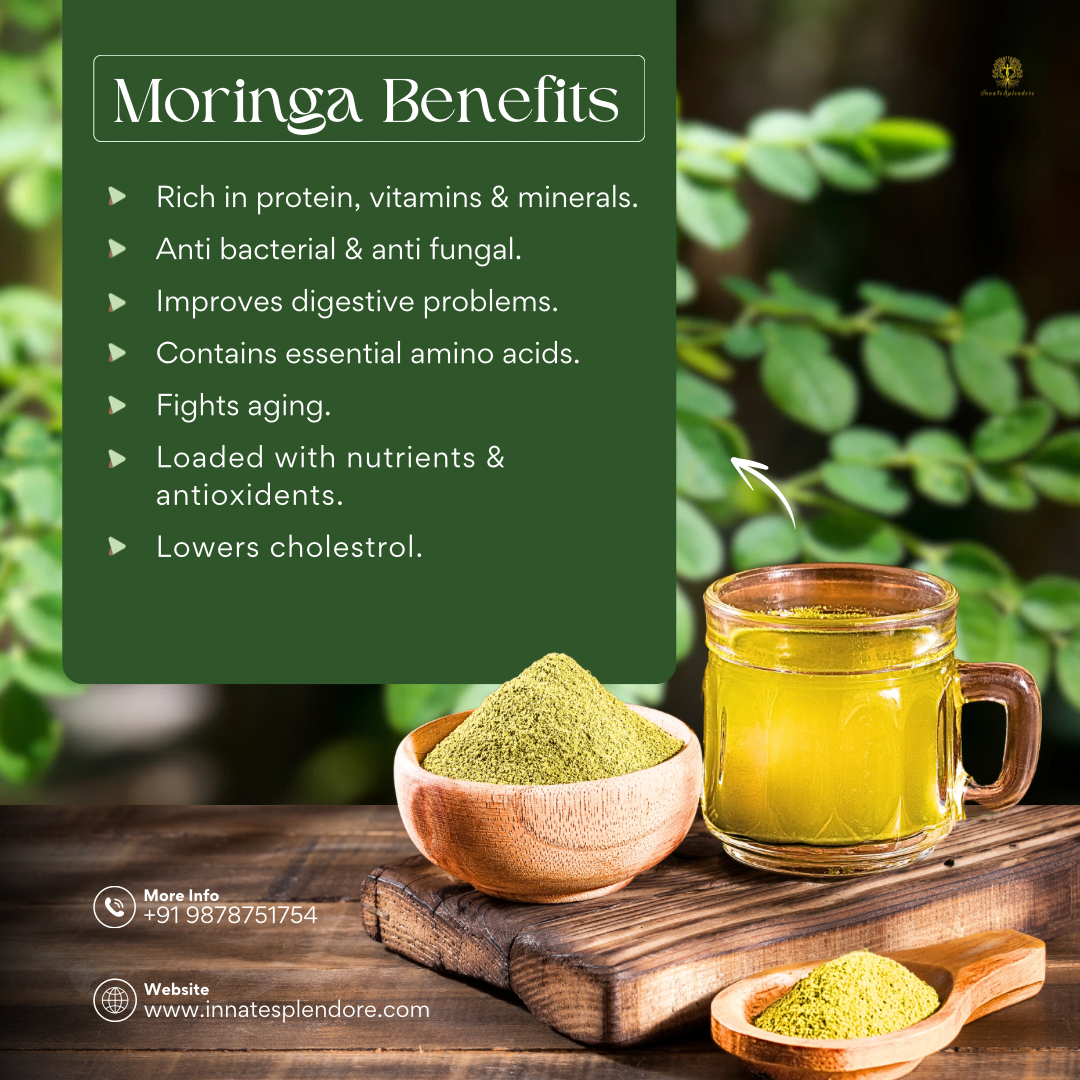Moringa, often referred to as the "drumstick tree" or "miracle tree," has been a staple in traditional medicine for centuries. Known for its incredible nutritional profile and numerous health benefits, moringa has recently gained recognition as a superfood in the wellness community. But what exactly makes moringa so beneficial? Let’s dive into the reasons why this plant is earning such praise and how you can incorporate it into your daily routine.
What is Moringa?
Moringa is a fast-growing, drought-resistant tree native to parts of Africa and Asia. Its leaves, pods, seeds, and roots are all used for various medicinal and culinary purposes. Among its most impressive features is its nutrient density, packed with vitamins, minerals, and antioxidants. From the leaves to the seeds, every part of this tree offers health benefits that make it a true gift from nature.
1. Rich in Nutrients
Moringa leaves are packed with essential nutrients that our body craves. Just one tablespoon of moringa powder contains:
-
Protein: Moringa is an excellent plant-based protein source, providing all the essential amino acids.
-
Vitamins: High in vitamin A, vitamin C, vitamin E, and several B vitamins.
-
Minerals: Moringa contains calcium, iron, magnesium, potassium, and zinc, which are vital for various body functions.
-
Antioxidants: Moringa is loaded with antioxidants such as quercetin, chlorogenic acid, and beta-carotene that protect the body from oxidative stress.
2. Supports Immune Health
Thanks to its rich vitamin C content, moringa can help strengthen the immune system. Vitamin C is a key nutrient in the production of white blood cells, which are essential for fighting off infections and illnesses. Additionally, moringa’s antibacterial and antiviral properties support the body in warding off infections.
3. Boosts Energy and Reduces Fatigue
If you're feeling sluggish or fatigued, moringa might be the natural pick-me-up you need. Its combination of vitamins, minerals, and antioxidants helps improve overall energy levels. Moringa is also known to reduce symptoms of chronic fatigue and even help combat anemia due to its high iron content.
4. Improves Digestion
Moringa is a natural digestive aid. Its anti-inflammatory properties can soothe the digestive tract, helping to reduce bloating, gas, and constipation. Moringa also supports the growth of beneficial bacteria in the gut, promoting a healthy microbiome. Additionally, its high fiber content aids in digestion and regular bowel movements.
5. Supports Heart Health
Moringa has been shown to have a positive effect on heart health. Studies suggest that it can help lower blood pressure and reduce cholesterol levels, which are significant risk factors for heart disease. The antioxidants in moringa, such as flavonoids, may also protect the heart from oxidative damage and inflammation.
6. Regulates Blood Sugar Levels
Moringa may be beneficial for people with diabetes or those at risk of developing the condition. Several studies have shown that moringa can help lower blood sugar levels and improve insulin sensitivity. The plant’s high chlorogenic acid content plays a key role in this by slowing the absorption of sugar into the bloodstream.
7. Anti-Inflammatory and Pain Relief
Moringa’s anti-inflammatory properties make it an excellent choice for reducing inflammation in the body. Chronic inflammation is linked to various diseases such as arthritis, asthma, and heart disease. Moringa’s ability to inhibit inflammatory markers in the body can provide relief from joint pain, swelling, and muscle soreness.
8. Promotes Skin Health
The antioxidants, vitamins, and minerals found in moringa are beneficial for healthy, glowing skin. Moringa’s vitamin C content helps promote collagen production, leading to firmer skin. Its anti-inflammatory and antibacterial properties can help clear up acne, soothe skin irritation, and reduce the appearance of scars and blemishes.
9. Supports Brain Function
Moringa is also good for brain health. It contains compounds like vitamin E and vitamin C, which help protect the brain from oxidative damage that can lead to neurodegenerative diseases such as Alzheimer's. Moringa’s ability to reduce inflammation and boost memory and cognitive function has made it a popular supplement for those looking to support brain health.
10. Promotes Healthy Hair Growth
Moringa’s rich nutrient profile also extends to hair health. Its high levels of vitamins A and C promote the production of sebum, an oily substance that nourishes the scalp and helps hair grow stronger and healthier. Moringa also prevents oxidative stress on hair follicles, reducing the risk of hair loss and promoting thicker, more vibrant hair.
How to Incorporate Moringa into Your Diet
There are many ways to enjoy the benefits of moringa. Some popular methods include:
-
Moringa powder: Add moringa powder to smoothies, teas, or shakes. You can also sprinkle it on top of soups or salads for an extra nutritional boost.
-
Moringa capsules or tablets: For those who prefer a more convenient option, moringa supplements are widely available.
-
Moringa tea: Steep moringa leaves in hot water for a healthy, antioxidant-packed tea.
-
Moringa oil: Use moringa oil for skin and hair care, or as a cooking oil due to its high smoke point.
Final Thoughts
Moringa is undeniably one of nature’s most potent superfoods, offering a wide array of benefits for overall health and wellness. Whether you're looking to boost your energy, support your immune system, improve your digestion, or enhance your skin and hair health, moringa can be a game-changer. As with any supplement or food, it's important to consult a healthcare professional before making significant changes to your diet. But when used as part of a balanced, healthy lifestyle, moringa can help you feel your best and live your healthiest life.


